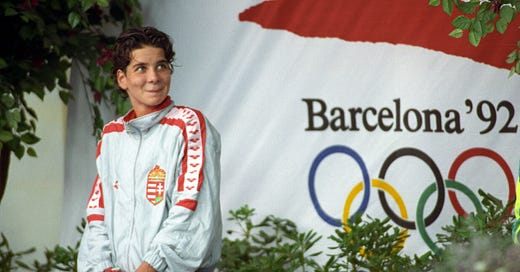What the Olympics can teach us about the world
It's been two months since the 2024 Olympics, and I haven't been able to get it out of my mind. What's this got to do with mindset and money? Here's my attempt to explain why.
There’s a great TS Eliot poem of the early 20th century, “The Love Song of J. Alfred Prufrock”.
The poem’s original title was “Prufrock Among the Women”, which hints at its subject matter — a poem about an ordinary everyday failure of a man and the incessant chatter of his innermost desires unrealized and lingering regrets for all the opportunities missed.
It is an extraordinary poem, not least because TS Eliot was just 21 when he wrote it. (In that way, it’s a bit like Jackson Browne’s song “These Days”, a song which deals with the regrets of life and love — “These days I seem to think a lot / About the things that I forgot to do for you / And all the times I had the chance to / And I had a lover / But it's so hard to risk another, these days”. When he wrote the song in 1964, Browne was 16.)
As poems go, Prufrock is not exactly an easy read, but like the best works of art, it has layers and depths that reward you each time you return to it. There’s one line in there that’s come back to mind repeatedly over the past couple of months.
“I measured out my life in coffee cups.”
I, for decades, have measured out my own ordinary life and its own ordinary failures in four-year Olympic cycles.
Indulge me.
Seoul in 1988: Sitting with my family — us children all still children, parents still together and still happy enough, or so it seemed, even just a few years before the cataclysm of marital and family separation. I remember watching the final of the men’s 100 meters, gazing in awe as Ben Johnson, the Canadian sprinter, muscles and yellowing eyeballs bulging, punched the air while breaking the world record in 9.79 seconds. I recall the news a day or two later, scandal breaking as Johnson was found to have steroids in his system. (That race in Korea is now widely seen as the dirtiest ever run.)
Barcelona 1992: My family splitting apart at the seams, the final few weeks in the house that was our home since we were born, Freddie Mercury singing the city’s name and the Olympic flame lit by flaming arrow. That home was an idyll of a small house in the country beside a farm field with a small pond in the corner where I must have knelt for days on end, because I remember how a gluey mass of frogspawn one day erupted into a shoal of swimming tadpoles the next.
There was no room for frogspawn in my father’s new house, a semi-detached in a housing estate in the town. There, the laddish chatter on street corners and in unfamiliar sitting rooms was played out against a soundtrack of Red Hot Chili Peppers music: their album Blood Sugar Sex Magik was fresh and new, MTV had brought “Give It Away” and “Under The Bridge” into our consciousness, and Chubby Lee was the coolest boy I’d ever known or ever would, who carried a ghetto-blaster to the green in the middle of the estate and who five years later would be dead, one of three friends killed in a car accident before he could ever become a man.
That summer of 1992 was all American: the Chili Peppers, MTV and basketball. All the young teenage boys who lived in the estate talked about the “Dream Team”, the US basketball superstars of the NBA — Michael Jordan, Magic Johnson, Scottie Pippen, athletic giants of black men unlike anything anyone had ever seen around our small Irish town — who had come to Barcelona, a sort of exhibition team putting amateurs from around the world to the sword on their way to the gold medal.
That summer was almost all American.
Keep reading with a 7-day free trial
Subscribe to Fee Sheet to keep reading this post and get 7 days of free access to the full post archives.




